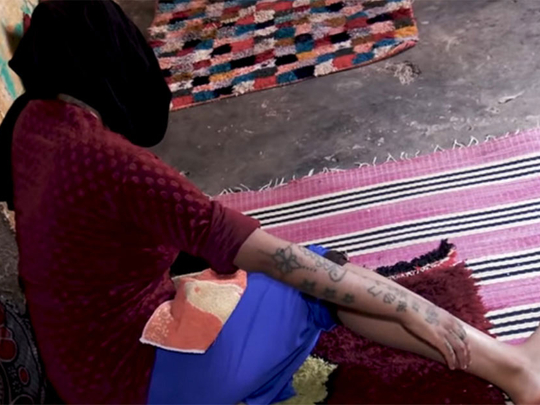
Dubai: Seventeen-year-old Khadija says she was kidnapped from her aunt’s house in Morocco and raped and tortured for two months.
The Moroccan teenager appeared on a Youtube TV channel called Chouf last week where she talked about her ordeal, saying that for two months she was gang raped, forcibly tattooed with swastikas and other symbols, and burnt with cigarettes.
Police have arrested 12 men, aged between 18 and 27, since her imprisonment.
"I will never forgive them - they have destroyed me," she said. "I tried to escape several times, but I was caught and beaten."
خديجة هي واحدة من كثير هناك الكثير من الفتيات تعرضن الإغتصاب لكنهم غير قادرين على بوح مامصيرهم ؟ إعدام إجباري #التجنيد_الاجباري #كن_رجلا_ولاتغتصبها #كلنا_خديجة
— Ha Jar💛 (@sali877) August 27, 2018
"They tortured me, they did not give me food or drink, and they did not even allow me to take a shower," she recalled.
“How many women who for fear to be shamed continue to keep quiet?” she asked.
#كلنا_خديجة ✌🏽 مع حكم الإعدام ضد المغتصبين ، حرام بنت ف عز شبابها تحطم بسبب مجموعة من المرضى العقليين الفاقدين للإنسانية ، لا حول و لا قوة إلا بالله .
— رجاء بلمير (@BelmirRaja) August 25, 2018
Khadija says she was drugged during captivity and forced into prostitution in the house where she was being held.
Khadija’s father said: “She returned in mid-August, after a family friend convinced one of the abductors to bring her back and promised him that the police won’t be informed”.
He added that “the boy is among the arrested gang members”.
The main suspect, who is 20 years old, faces charges of human trafficking, rape, torture, kidnapping, making death threats and forming a gang. The others could face similar charges.
The trial begins on September 6. No official statement has been issued by the police or interior ministry.
A call for capital punishment
Moroccans have taken to social media platforms to express anger, launching the ‘Justice for Khadija’ and ‘We are all Khadija’ hashtags and calling for the execution of the rapists.
Please sign this petition to help Khadija, the young moroccan victim of kidnapping, gang rape and physical abuse. #JusticeForKhadija #JusticePourKhadija #كلنا_خديجة https://t.co/aJHXV8a82h
— amerruĸı (@Amerruki) August 26, 2018
Capital punishment remains legal in Morocco, but an unofficial moratorium has been in place since the last execution in 1993. The last person who was executed was a public official, known to media as Commissioner Tabit, who was convicted of raping a more than 500 women and taking videos of the acts.
Morocco’s rate of reported rapes increased from 800 cases in 2016 to 1,600 cases in 2017, according to an annual report issued by the King’s attorney general, Mohammad Abdel Nabawi.
In March this year, a Moroccan man was arrested after a horrific video emerged showing him wrestling a young girl to the ground and stripping her.
Last August, mass protests were held when another video emerged showing the aggressive sexual assault of a young woman with learning difficulties by a group of teenagers on a bus.
A petition was issued by human rights activists urging King Mohammad VI to provide Khadija with medical and psychological care and support until she can reintegrate into society.
A Tunisian women rights group also raised money to take Khadija to Tunisia and provide her with treatment to remove the tattoos and burn scars.












